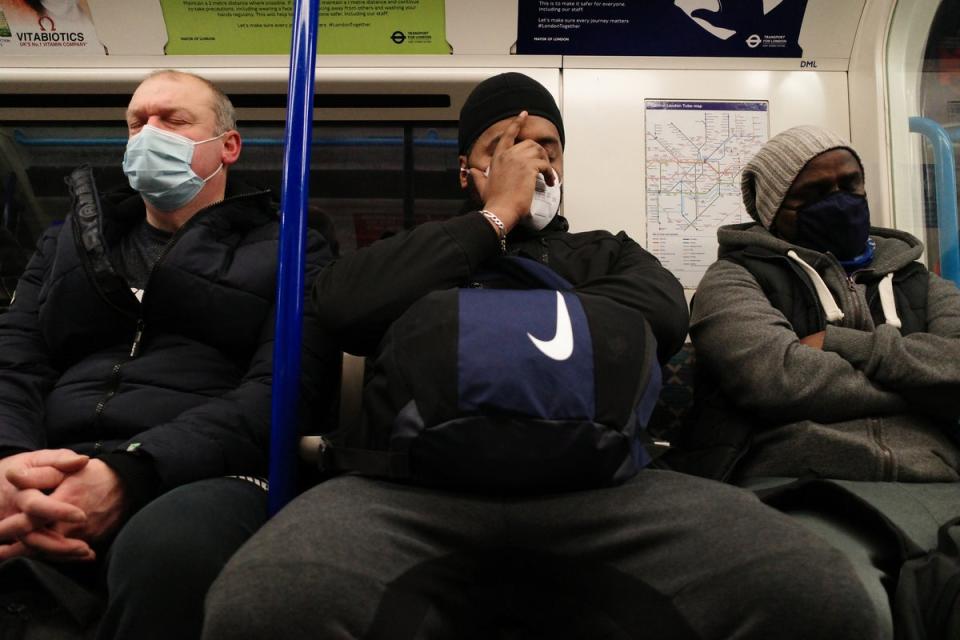Should I start wearing a mask on public transport again?
Experts are concerned that a new wave of Covid-19 is causing a surge in infections in the UK as winter draws in.
In the week ending 26 September, figures from the Office for National Statistics show that 1.3 million people tested positive for Covid, up from 1.1 million the week before.
The number of people being admitted to hospital with the illness is also rising, having increased by 37 per cent last week.
According to NHS England, 9,631 people with Covid were in hospital as of 8am on Wednesday (5 October), the highest figure since 3 August.
In addition to rising Covid cases, scientists are also worried that there may be an increase in flu and other respiratory illnesses.
In Wales, government scientists suggest that all these conditions could account for more than a quarter (28 per cent) of total hospital bed capacity at the winter peak in the “worst case scenario”.
As people spend more time indoors and take public transport more often to stay out of the cold, many may be wondering if we should wear face masks on buses and trains again despite no official guidance to do so.
Here’s everything you need to know.
Should I wear a face mask on public transport?
Although the government has not mandated the use of face masks of public transport as it did last year, the rising number of Covid cases may prompt more people to put coverings on to protect themselves and others.
Some companies strongly recommend that commuters use face masks, such as Transport for London. However, it is not mandatory.

Studies have shown that wearing a face mask can reduce the number of virus-carrying particles released from the nose and mouth of an infected person, therefore preventing the disease from spreading.
Official guidance on living with Covid encourages people to consider wearing a face mask “when Covid-19 rates are high and you will be in close contact with other people, such as in crowded and enclosed spaces”.
This includes packed trains, tubes and buses.
It also recommends wearing a face mask in when “there are a lot of respiratory viruses circulating, such as in winter” and people are more likely to be in crowded indoor spaces.
Anyone with virus symptoms or a positive test should wear “a well-fitting face covering or face mask” if they must leave their homes to help reduce the spread.
How do I know if I have Covid?
People who contract Covid often experience a number of common symptoms. You can also check by taking a Covid test at home, which you can purchase online.
You may have Covid if you are experiencing the following symptoms:
A high temperature
A new, continuous cough
A loss or change to your sense of smell or taste
Shortness of breath
Fatigue
Sore throat
Aching body
Headache
Blocked or runny nose
Loss of appetite
Diarrhoea
Feeling nauseous or being sick
What other measures should I take this winter?
Scientists and government figures are urging the public to ensure they get a flu jab and a Covid booster jab if eligible.
In London, mayor Sadiq Khan called on those who are eligible to get their vaccines as soon as possible, after he received his own in a bid to encourage others.
The NHS is offering a Covid booster and flu vaccine to a wide range of people to help reduce the impact of the viruses, with GP surgeries and pharmacies among those offering the jabs.
Khan said that getting both vaccines will help reduce the threat of a “twindemic” this winter.
“Thanks to the success of the lifesaving COVID vaccine, our city is thankfully in a completely different place to where we were this time last year, but with winter coming it’s really important that we all remember that COVID-19 and the flu have not gone away,” he said in a statement.
“Both of these diseases can be life-threatening, and we must do all we can to protect ourselves and reduce the chances of a ‘twindemic’ adding further pressure on our hospitals and healthcare services. I urge Londoners who are eligible to take-up the offer of a flu vaccine and COVID booster as soon as possible for the good of themselves, their loved ones and the NHS.”

